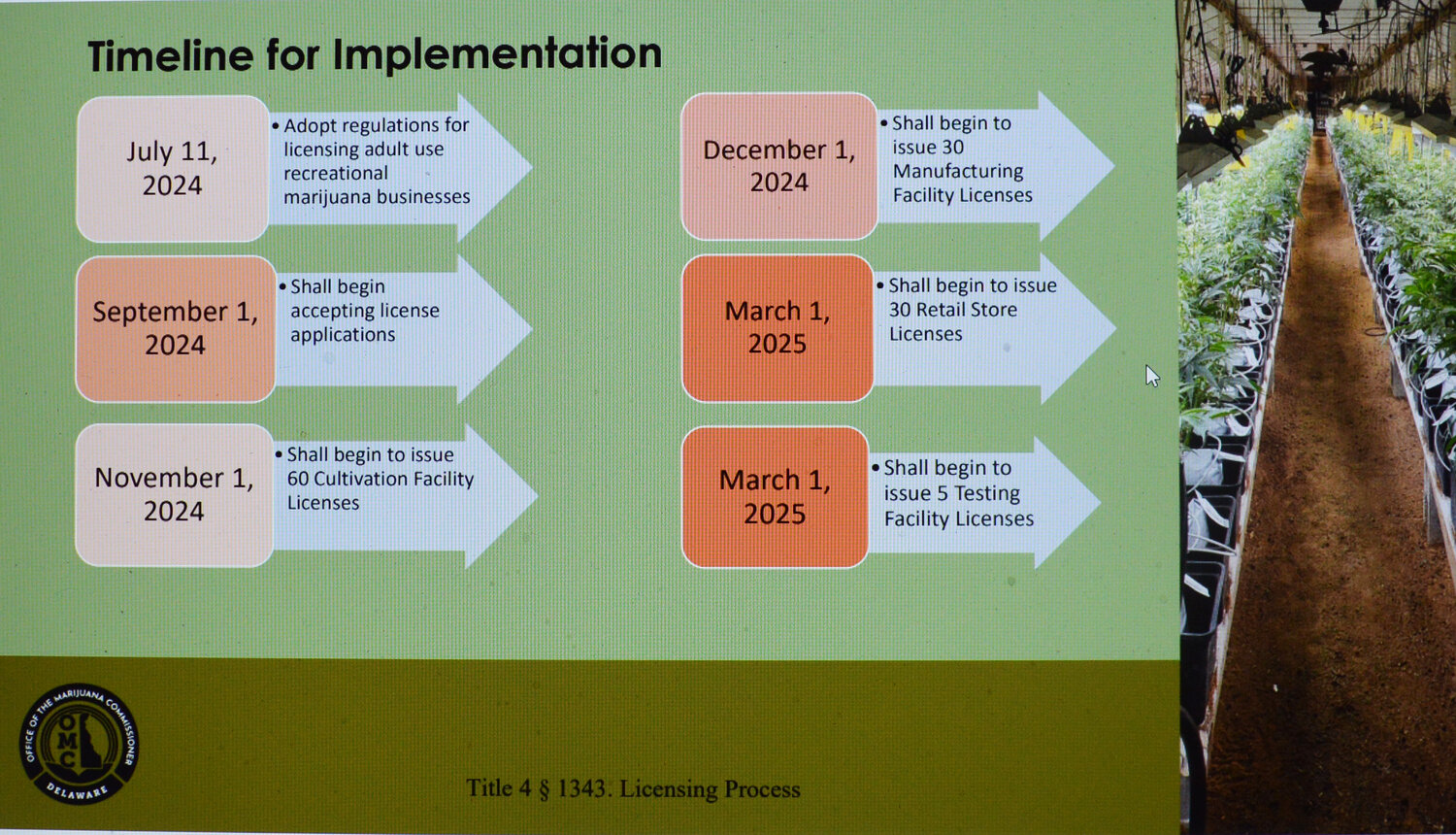Delaware marijuana commissioner: Program targets black market
As the state’s marijuana commissioner, Robert Coupe’s task is to educate municipalities, rather than influence them, about provisions in Delaware’s Marijuana Control Act.

You must be a member to read this story.
Join our family of readers for as little as $5 per month and support local, unbiased journalism.
Already a member? Log in to continue. Otherwise, follow the link below to join.
Please log in to continue |
Delaware marijuana commissioner: Program targets black market
GEORGETOWN — As the state’s marijuana commissioner, Robert Coupe’s task is to educate municipalities, rather than influence them, about provisions in Delaware’s Marijuana Control Act.
“Just to be clear: This is a decision that will be made (by) your town (about) what is best for your town, what is best for your citizens,” he said in a Feb. 26 presentation to Georgetown’s mayor and Town Council. “I am simply letting you know what our program is so that you can make an informed decision.”
Georgetown is one of the remaining municipalities in Delaware that has not yet made a decision on House Bill 2, legislation that empowers towns to allow, prohibit and/or implement restrictions on marijuana operations now legal in Delaware. Many Downstate municipalities have instituted bans, prohibiting all elements of manufacturing, testing and sale of cannabis in their jurisdictions.
“I wanted to give you as much information as I could about the work we’re doing, about what the Marijuana Control Act means and what authority you have as a local town government to make decisions about how you want to implement this or not,” Mr. Coupe said.
A primary goal is to reduce the black market for illegal marijuana. Another is to provide legal-age patrons a much safer product, grown organically indoors. For example, a converted chicken house in Frankford is now manufacturing marijuana for the state’s medicinal program.
“Because of our standards for the quality and safety of molds and pesticides and things like that, indoor grows are the only ones that have been successful,” Mr. Coupe said, also sharing a Canadian study that found a 92% presence of pesticides, compared to only 6% in unregulated products.
“Marijuana in itself is not safe. But the state-regulated market essentially is cleaner and safer. The idea is to have a reduction of the illegal market where customers are using state safety standards,” he added.
House Bill 1, which legalized the recreational use of marijuana in Delaware, allows those 21 and older to possess up to 1 ounce of leaf marijuana, 12 grams of concentrated cannabis or cannabis products containing 750 milligrams of delta-9 THC.
Mayor Bill West supports the proposal.
“We see what the black-market stuff does to individuals because of the chemicals that are in it. I think that is the best thing we can (do to get) the black-market stuff off of the market. We don’t (know) what they are lacing it with now,” he said.
Mr. Coupe also noted that every marijuana plant is tracked via a seed-to-sale software program, via a tagged bar code.
“It is very important to the industry. We’re regulating it, and essentially, a marijuana plant is followed from seed to sale,” he said. “It allows us to regulate the industry and to make sure there is not inversion, where they are trying to bring in marijuana from outside, or diversion, where they are trying to take their stuff out the back door.”
For adult recreational marijuana, the Marijuana Control Act will allow up to 30 licenses for stores statewide, 60 for cultivation, 30 for manufacturing and five for testing labs. There are also social equity licenses.
Councilwoman Angela Townsend inquired about the social equity element.
Mr. Coupe replied, “The concept is that there were individuals who sold marijuana to a market made up of a lot of folks that maybe came from affluent areas, well-to-do areas. And they were using the marijuana and didn’t seem to get arrested. But those that took the risks to sell it were getting arrested … because it was illegal.”
Now that it is legal, he continued, the feeling is that those “selling it illegally have opportunity to compete in a now-legal market.”
The state has in place a medical marijuana program, via 2011 legislation. The first such facility opened in 2015.
In 2023, 17,000 medical marijuana patients spent an average of $3,303 per year on those products. It generated $49 million in sales the prior year.
“We are projecting, on the low end, that in the adult-use recreational market there will (be) 85,000 customers, with an estimated $281 million in annual sales,” said Mr. Coupe.
So, based on a 15% tax, the potential revenue for the state would be about $42 million annually.
That projected economic impact includes the creation of 275 jobs — 112 in New Castle County, 98 in Sussex and 65 in Kent.
But Councilman Tony Neal voiced concern.
“I have worked with incarcerated people my whole life. My concern is to make sure everybody is safe,” he said. “Some people just can’t handle it. They take a little bit, and they are going to take the extra mile.”
Mr. Coupe said various groups have reached out with their worry about marijuana use. But he and his office “wanted ... to use our platform to amplify those messages. Using marijuana is a choice, but we want to make sure it is an informed choice and people are aware of the risks.”
For additional information, visit omc.delaware.gov.


 By
By 



